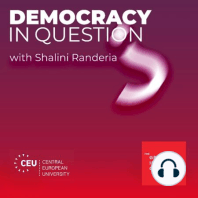25 min listen

Can liberal democracy right the wrongs of racial and gender injustices?
Can liberal democracy right the wrongs of racial and gender injustices?
ratings:
Length:
24 minutes
Released:
Nov 19, 2020
Format:
Podcast episode
Description
We have recently seen millions of people taking to the streets to protest social, political and environmental injustices. Even a global pandemic couldn’t stop protesters across the world from showing their support to the Black Lives Matter movement. In this episode, we’re joined by Professor Nancy Fraser(The New School) and ask: can liberal democracy provide the distributive justice citizens seem to crave?Democracy in Question? is brought to you by:• The Institute for Human Sciences in Vienna: IWM• The Albert Hirschman Centre on Democracy in Geneva: AHCD• The Excellence Chair and Soft Authoritarianism Research Group in Bremen: WOC• The Podcast Production Company Earshot StrategiesFollow us on social media!Institute for Human Sciences in Vienna: @IWM_ViennaAlbert Hirschman Centre on Democracy in Geneva: @AHDCentreSubscribe to the show. If you enjoyed what you listened to, you can support us by leaving a review and sharing our podcast in your networks!BIBLIOGRAPHY• Nancy Fraser is currently writing a book on cannibal capitalism, which she and Shalini Randeria are starting to refer to at minute 17:30. Final book title and publication date have not been announced yet.• Feminism for the 99%: A Manifesto. (2019). Co-authored with Cinzia Arruzza and Tithi Bhattacharya.• Capitalism: A Conversation in Critical Theory. (2018). Co-authored with Rahel Jaeggi.• Contradictions of Capital and Care. (2016). New Left Review, 100.GLOSSARYWhat is ethnonationalism?(00:02:30 or p. 2 in the transcript) Ethnonationalism refers to the idea that legitimate membership in the nation is limited to those with the appropriate immutable, or at least highly persistent, traits, such as national ancestry, native birth, majority religion, dominant racial group membership, or deeply ingrained dominant cultural traits. Source.What is identity politics?(00:07:30 or p. 5 in the transcript)The term identity politics signifies a wide range of political activity and theorizing founded in the shared experiences of injustice of members of certain social groups. Rather than organizing solely around belief systems, programmatic manifestos, or party affiliation, identity political formations typically aim to secure the political freedom of a specific constituency marginalized within its larger context. Members of that constituency assert or reclaim ways of understanding their distinctiveness that challenge dominant characterizations, with the goal of greater self-determination. Learn more.What does identitarian mean?(00:10:00 or p. 5 in the transcript)The term identitarian often refers to supporters or advocates of the political interests of a particular racial, ethnic, or national group, typically one composed of Europeans or white people. Source. Click here to learn more about far-right Identitarian movements in Europe. What are pronatalist policies?(00:10:00 or p. 6 in the transcript)Pronatalist policies aim at encouraging a high fertility rate. Examples can include government support of a higher birthrate but also criminalization of abortions. Learn more.What is a meritocracy? (00:12:00 or p. 7 in the transcript)Meritocracy represents an ideal vision in which power and privilege would be allocated by individual merit, not by social origins. Click here to learn more about the controversies surrounding this ideal.What is Second Wave Feminism(00:12:30 or p. 7 in the transcript)Second wave feminism was a period of feminist activity and thought that began in the early 1960s and lasted roughly two decades. It began in the U.S. and quickly spread across the Western world. This wave unfolded in the context of the anti-war and civil rights movements. Learn more.What is neotraditionalism?(00:12:30 or p. 7 in the transcript)The concept of neotraditionalism breaks with notions of deeply rooted cultural essences or characterizations of static antimodern tradition. Such an approach trea
Released:
Nov 19, 2020
Format:
Podcast episode
Titles in the series (77)
When and how is power visible in politics? by Democracy in Question?